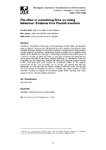The effect of subsidising firms on voting behaviour: Evidence from Flemish elections

View/
Use this link to cite
http://hdl.handle.net/2183/23336Collections
Metadata
Show full item recordTitle
The effect of subsidising firms on voting behaviour: Evidence from Flemish electionsDate
2012Citation
Buts, C., Jegers, M., & Jottier, D. (2012). The effect of subsidising firms on voting behaviour: Evidence from Flemish elections. European Journal of Government and Economics, 1(1), 30-43. https://doi.org/10.17979/ejge.2012.1.1.4275
Abstract
[Abstract] Despite an international consensus on the importance to limit State aid spending, large amounts of resources are still devoted to a wide variety of subsidies to firms. A sizable literature studies the relationship between general government spending and the proximity of elections, mostly documenting a positive link. In addition, other studies verify whether this strategy of increasing government expenditure pays off in terms of number of votes. We focus on one type of government spending that can be quite vulnerable to becoming ‘targeted spending’, i.e. subsidies to firms. We empirically test the relationship between the amount of subsidies granted to firms at the local level and local support for incumbent parties in the regional government. To that end, we make use of subsidy data derived from financial statements on 2008 and Flemish election results of 2004 and 2009. We find that the total amount of subsidies as well as subsidies per capita granted in 2008 positively correlate to support for incumbent parties 2009, meaning that voters appear to reward subsidy granting politicians.
Keywords
Subsidies
Voting behaviour
Industrial policy
Voting behaviour
Industrial policy
Editor version
Rights
Atribución 4.0 España
ISSN
2254-7088






